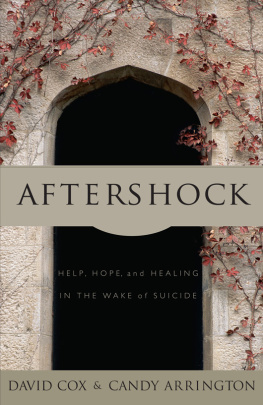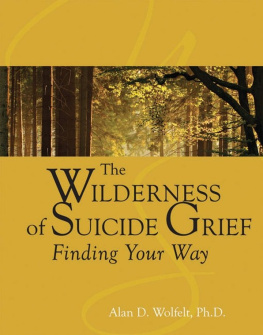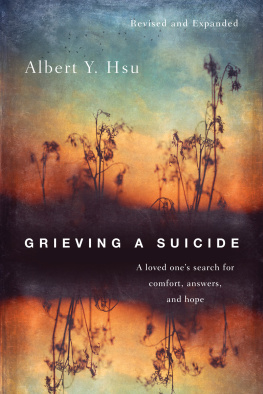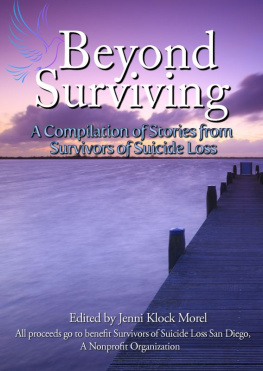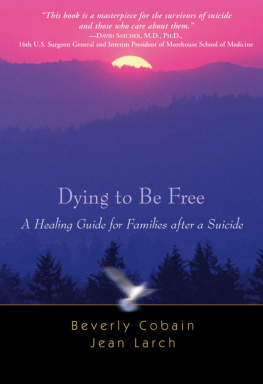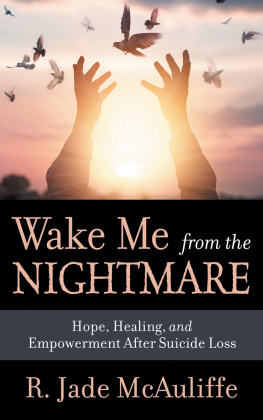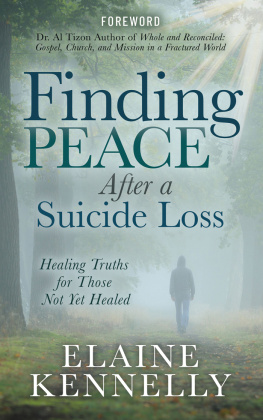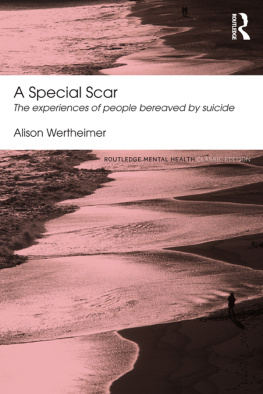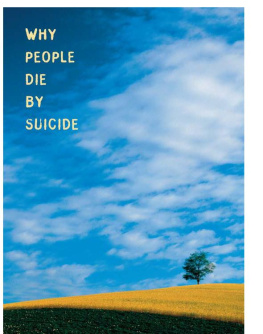
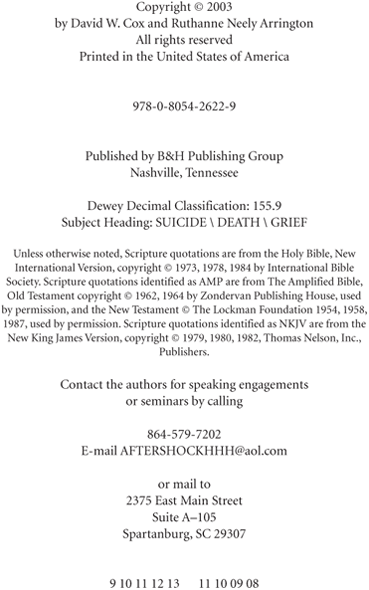
Dedicated
To my dad,
John Woodbury Cox,
loving Christian husband and father,
Sunday school teacher and deacon,
active in community service,
decorated World War II and Korean War veteran,
lover of trains and baseball,
and
a victim of suicide.
David
To my dad,
Hugh Asbury Neely,
loving Christian husband and father,
Sunday school teacher and deacon,
decorated World War II veteran,
builder of solid houses,strong family ties,
loving relationships,
and
a victim of cancer.
Thank you for teaching me I can do all things through Christ.
Candy
Preface
I n a casual conversation, David mentioned to Candy, I've always wanted to write a book, but I don't have any idea how to go about it.
I've never written a book before, but I know what to do, Candy responded.
Several work sessions produced a proposal, outline, and sample chapter. The foundation was laid. The words of Psalm 127:1 became the theme for the project: Unless the Lord builds the house, they labor in vain who build it (NKJV).
Candy met Len Goss of B&H at the 2001 Blue Ridge Mountain Christian Writer's Conference. She presented the proposal to him, and was surprised when six other conferees spontaneously shared their personal stories of suicide's impact on their lives. Len said, I thought your idea was too narrow, but now I see this table is a microcosm of society. There is a need for this book.
Although this book is coauthored, for the ease of the reader it is written in first person with David as the speaker, except where noted. Candy researched, conducted interviews, and prepared the manuscript. David offered insights from his personal experience with suicide, his paramedic career, and his counseling ministry. The project was very much a joint effort, and neither could have produced the book without the other.
The book is written specifically to survivors of suicidethose left behind following a suicidebut will also be helpful to ministers, those in intervention, and anyone who struggles with what to say to those who have experienced a devastating life crisis. The sections on depression, fear, and forgiveness are applicable to anyone, not just to people dealing with suicide. Our heartfelt prayer is that the message of this book will bind wounds and open a pathway of hope and restoration to the grieving.
The Lord's hand has been on this project from its inception. We acknowledge his direction and leadership in all phases of the writing and publishing process. God has done, and continues to do, amazing things. This book is nothing about our abilities, but everything about God at work in us. To him be all the glory.
Acknowledgments
With special thanks from David:
- To my wife, Kelly, for reflecting Jesus with your life.
- To my childrenScott, Phil, Kellyn, Leslie Ann, and Lucifor the opportunity to be to you what my dad was unable to be to me.
- To my coauthor, Candy, for challenging me and encouraging me to write this book. It wouldn't exist if it were not for you.
- To my mother, Lunelle Comer, for holding our family together after the earthquake.
- To my wonderful sisters and fellow survivors, Nancy and Janet.
- To my pastors, Don Horton and Tony Cribb, for all the years of support and encouragement.
- To Kirk H. Neely, my mentor, who first saw the counselor in me.
- To Phil Phillips, Sunday school teacher, basketball coach, big brother, and friend.
- To the Spartanburg S.O.S. group, where I first saw the need for this book.
- To my loyal and trusting counselees, for giving me the opportunity to minister.
With special thanks from Candy:
- To my husband, Jim, for your love, encouragement, support, and editing skills. I love you and am thankful for our life together.
- To my children, Neely and Jay. I love you both with all my heart.
- To David, my coauthor and friend, for allowing me to build this house with you. You are the brother I never had.
- To my mother, Mildred Neely, my most ardent cheerleader.
- To the survivors, for sharing their stories.
- To Linda Gilden and Dalene Parker, for manuscript review and comments.
- To Len Goss, who caught the vision and took a chance on two virtually unpublished authors.
CHAPTER 1

Suicide:
An Earthquake of
Catastrophic Proportions
But God intended it for good to accomplish what is now being done,
the saving of many lives (Gen. 50:20).
DAVID'S STORY
O n July 17, 1967, an earthquake rocked my world. Felt by relatively few people, it devastated those of us at its epicenter and brought chaos to our lives. Although not a dynamic force of nature, the event shook my universe, crumbled my stable foundation, and sent shock-waves far into the future. It was suicide.
Suicide is a subject I would rather consign to a dusty corner of my mind. I would like to but can't because I think about it every day. Whether in my counseling ministry or in the shadowy haze of memory, suicide is a topic I cannot escape.
In a nine-year-old boy's mind, life in Memphis, Tennessee, was perfect. Then July 17 dawned. On that day my perfect world was shattered; my life was forever changed.
I was cutting the grass when I saw my father pull out of the driveway in his white 1966 Mustang. To this day, when I see one of those cars, an involuntary shudder hits me, yet I keep a die-cast model of his car on my desk to remind me that God causes all things to work together for good (Rom. 8:28). As usual, I shouted out over the roar of the mower, Dad, where are you going? I expected to hear his familiar reply, Goin' crazy. Wanna come along?
That day the answer was different. I have to go somewhere. His answer puzzled me. He drove off, than stopped the car to look back at me. The look on his face will forever trouble me. If only I had known what he was going to do, the somewhere he was going, could I have said something to stop him? I've relived that moment a million times. I never saw him alive again.
My mother found his note when she got home. She was frantic, but I didn't know why. She sent me off to the neighbor's house while she contacted the police. I spent a sleepless night there, separated from my family, wondering, as I peered out the window, why all those police cars and people surrounded our house. I later learned the police found his body at the horse show arena during the night. Why my father chose that location for his death is still a mystery to me.
The next day I had a sense of urgency about going home. I tried to enter the house, but it felt almost as if I were crossing a picket line. Arms reached out to intercept me, and I was prevented from going inside. This was when my concern increased, and I became fearful that something had happened to my mother. Up to this point, I never associated Dad's odd behavior the previous afternoon and my mother's sense of panic with the ensuing chaos at our house. Later, after being taken to a house I had never been to before, I was brought home. People jammed the room. My mom was lying on the couch. Although I was relieved to see her, I knew something was very wrong. My mother was alive, but she seemed incapacitated. Because she couldn't tell me herself, my Sunday school teacher broke the news of my father's death to me.
Next page
